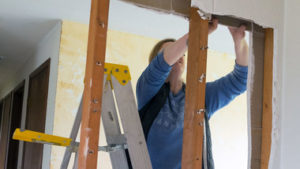Homebuyers’ Advice

Buyers Are Considering Fixer Uppers
The limited number of entry-level homes for sale coupled with rising prices is turning many homebuyers’ attention toward homes that need updating or repairs.
Homes that need work are in less demand than those in pristine condition, allowing homebuyers to pay less, and get the features and look they want through remodeling. Fifty-nine percent of homebuyers between 18 and 34 years-old are willing to tackle a fixer-upper, according to realtor.com’s most recent homebuyer survey.
Half of participating homebuyers are willing to spend $20,000 or more on improvements and 95% are confident they’ll get a positive return on their investment.
Ideas for renovations are easy to find on cellphones or tablets, from Pinterest and Instagram to Houzz, to a plethora of home remodeling shows on television. In fact, 60% of homebuyers surveyed said they were influenced by home remodeling shows to consider buying a fixer-upper.
One-third of homebuyers said that a kitchen upgrade would be their first priority, and one-quarter said they wanted to remodel a bathroom. A full 20% want new wood flooring.
The National Association of Home Builders found that homebuyers prioritize having a laundry room, along with Energy Star appliances and windows throughout the home.
Homeowners’ Advice

Running a Business From Your Home
As a homebuyer who intends to work from home, you want to find the perfect place to start or expand your at-home business. But there’s a lot more to consider besides finding the right space to do your work, including how your at-home business may affect your neighbors and you.
Here are a few things to keep in mind.
Business zoning. Many communities have zoning ordinances that place limitations on businesses operated from homes which are not zoned for commerce. Increased traffic, signage, parking problems, and noise could diminish home values. Contact your city and find out if there are any restrictions for the type of business you want to run.
Homeowner’s restrictions – Homes under homeowner’s association management may also have rules about at-home businesses because they’re also concerned with protecting property values. Obtain a copy of the HOA’s CC&Rs (governing documents) to learn what is permitted to prevent disruption to the community.
Taxing Authorities – Your CPA or tax attorney can explain homestead rules to you, and how much of your home you can use for business. IRS.gov provides rules for home business deductions, but if you have questions, contact your professional advisors.



